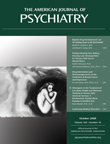Abstract
Objective: The authors evaluated the efficacy and safety of adjunctive aripiprazole in bipolar I patients with mania partially nonresponsive to lithium/valproate monotherapy. Method: This multicenter, randomized, placebo-controlled study included outpatients experiencing a manic or mixed episode (with or without psychotic features). Patients with partial nonresponse to lithium/valproate monotherapy (defined as a Young Mania Rating Scale total score ≥16 at the end of phases 1 and 2, with a decrease of ≤25% between phases) with target serum concentrations of lithium (0.6–1.0 mmol/liter) or valproate (50–125 μg/ml) were randomly assigned in a 2:1 ratio to adjunctive aripiprazole (N=253; 15 or 30 mg/day) or placebo (N=131) for 6 weeks. Results: Mean improvement from baseline in Young Mania Rating Scale total score at week 6 (primary endpoint) was significantly greater with aripiprazole (–13.3) than with placebo (–10.7). Significant improvements in Young Mania Rating Scale total score with aripiprazole versus placebo occurred from week 1 onward. In addition, the mean improvement in Clinical Global Impression Bipolar Version (CGI-BP) severity of illness (mania) score from baseline to week 6 was significantly greater with aripiprazole (–1.9) than with placebo (–1.6). Discontinuation rates due to adverse events were higher with aripiprazole than with placebo (9% versus 5%, respectively). Akathisia was the most frequently reported extrapyramidal symptom-related adverse event and occurred significantly more frequently among those receiving aripiprazole (18.6%) than among those receiving placebo (5.4%). There were no significant differences between treatments in weight change from baseline to week 6 (+0.55 kg and +0.23 kg for aripiprazole and placebo, respectively; last observation carried forward). Conclusions: Adjunctive aripiprazole therapy showed significant improvements in mania symptoms as early as week 1 and demonstrated a tolerability profile similar to that of monotherapy studies.



